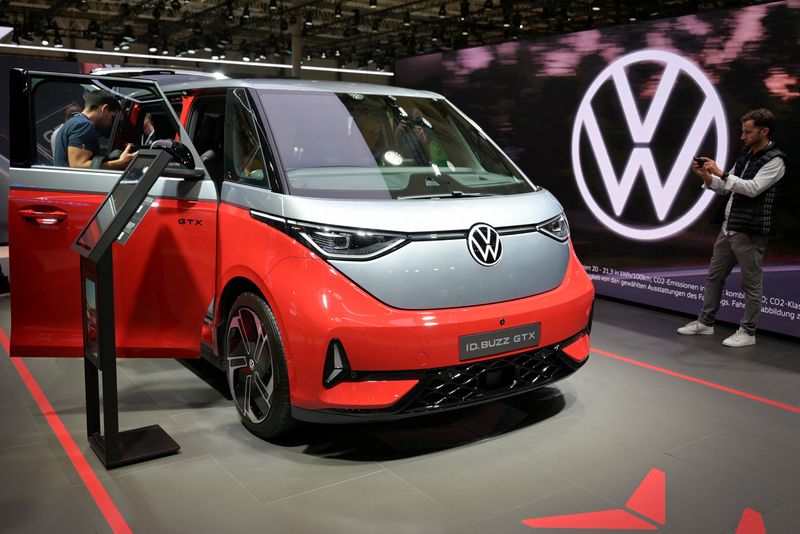By Sruthi Shankar and Danilo Masoni
(Reuters) – European auto stocks are so unpopular right now that investors keep reducing their exposure even as the scale of the industry’s problems has driven valuations close to record lows, which would normally be a big incentive for would-be buyers.
The STOXX 600 Autos and Parts index is among this year’s worst performers. Analysts predict a 13.6% earnings drop in 2024, a reversal from the years immediately after the pandemic, when supply chain snags handed carmakers licence to raise prices.
Investors believe large cost cuts are becoming unavoidable in a downturn driven by a complex technological shift, fierce competition from Chinese newcomers, and increasingly price-conscious consumers.
They say economies of scale are key, especially for mass-market brands like Germany’s Volkswagen, which is clashing with trade unions over unprecedented plans to shut factories on its home turf, due in part to the Chinese competition and rising labour and energy costs.
European autos now trade at a near-record 60% discount to the wider market represented by the pan-European STOXX 600 index on a price-to-earnings basis. Still, a BofA survey this month showed autos are the most underweighted sector among regional fund managers overseeing $284 billion.
“This toxic cocktail that you have – weakness in China, pricing that has fallen off the peak level, volume growth not happening anymore, higher labour costs – leaves room for some of these stocks to easily drop by another 10-20% if things sour,” said Rolf Ganter, head CIO for European equities at UBS Global Wealth Management.
“Valuations are really cheap, but we’re not pushing the sector at all.”
MORE WARNINGS AHEAD?
Shares in Volkswagen, BMW, Mercedes-Benz, Renault and Stellantis have fallen by as much as 29-50% from this year’s peaks, to multi-month and even multi-year lows.
“The Western auto industry is facing a huge challenge because of the advantage of the Chinese and people don’t want to spend as much money on EVs as they did a couple of years ago,” said Gilles Guibout, head of European equity strategy at AXA Investment Managers.
“Either you can raise your prices and justify a premium to customers, meaning your brand deserves it, or you have to cut costs – there’s no other option”.
European Union car sales plunged more than 18% in August from a year earlier. Sales of fully electric vehicles dropped 44%, led by steep declines in Germany and France, the bloc’s largest EV markets.
“There could be quite a lot of profit warnings coming our way, which suggests that it might just not be time to…buy the trough in the auto sector,” said Andreas Bruckner, investment strategist at BofA.
VALUE TRAP
EV demand has cooled to the point where several big automakers have scaled back their electrification plans, with Sweden’s Volvo Cars scrapping its target of going all-electric by 2030 earlier this month.
“For electric cars, you need to solve the basic problem, which is first producing electricity and systems that make this project feasible,” said Carlo Franchini, head of institutional clients at Banca Ifigest.
“Autos are not something to bet on right now. Reducing exposure is definitely not a bad idea,” he added, also saying that he didn’t think families were prioritising car purchases.
A pullback from electrification carries it own risks. Renault CEO Luca de Meo warned recently that European carmakers which exceed EU carbon emission limits in 2025 could face nearly $20 billion in fines due to slowing demand for EVs.
The sector is caught in the crosshairs of a trade dispute between the EU and China, with the former imposing tariffs on imported Chinese-made EVs on the basis of excessive and unfair subsidies to Chinese manufacturers.
A potential return of former U.S. President Donald Trump to the White House could also reignite a trade war with China that would have ramifications for Europe’s carmakers.
“It’s difficult to say if we have reached the bottom of the negative news on the sector yet: even if valuation is tempting it could be a value trap in the absence of a recovery,” said Chiara Robba, head of LDI equity at Generali Asset Management.
“The sector needs to be supported with a full transformation of the supply chain, the manufacturing and the recharging infrastructure to help mobility and improve EV demand.”
(Reporting by Sruthi Shankar in Bengaluru and Danilo Masoni in Milan; Editing by Kirsten Donovan)

